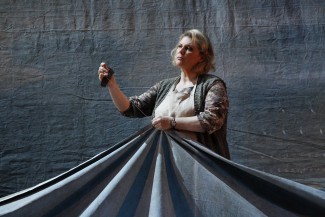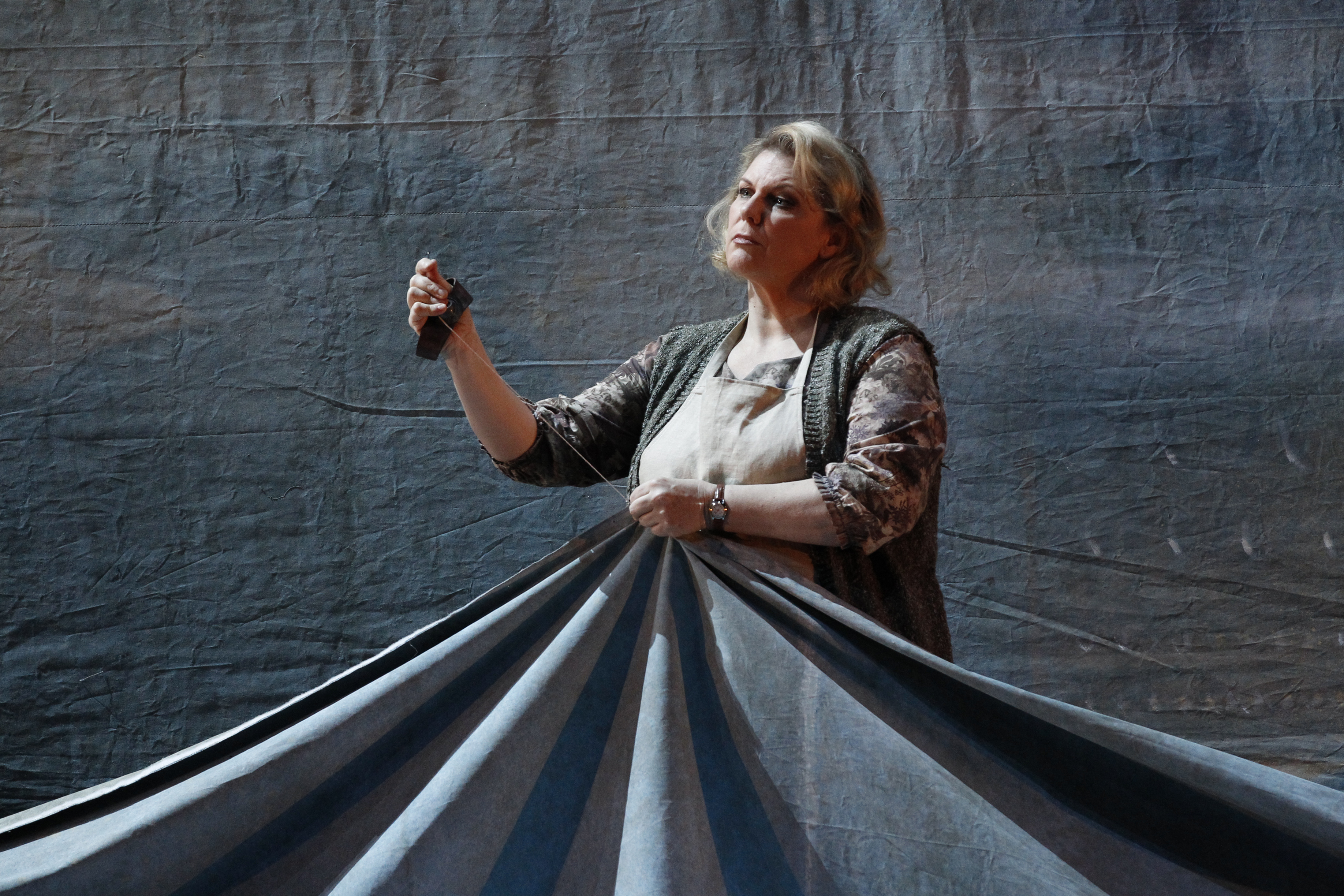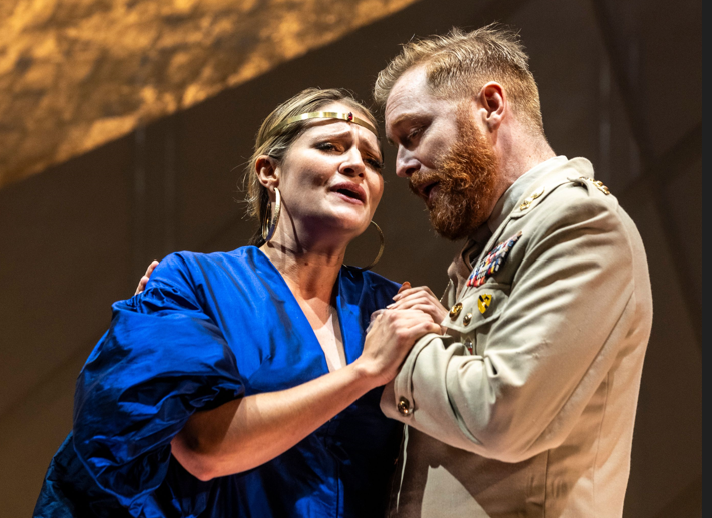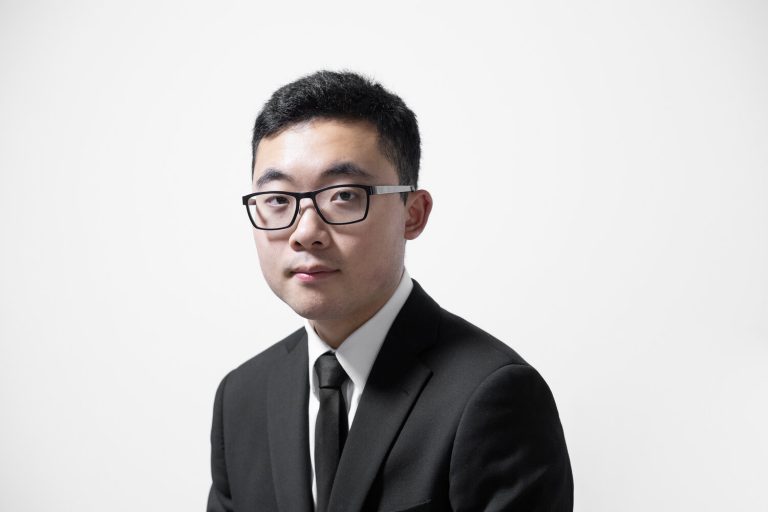Dark In The Spotlight – Jacqueline Dark On Becoming Fricka

She’s a prodigiously gifted singer and actress, recognised for her roles from the high classics, through the great romantics, to music theatre. She owns the stage, be it in opera, on Sydney harbour, in musicals or cabaret. When I spoke to mezzo-soprano Jacqueline Dark in Sydney, she was enjoying some much needed down-time after a hectic 12-month national tour as Mother Abbess in The Sound of Music, before becoming Fricka in Opera Australia’s 2016 reprise of Wagner’s The Ring Cycle. Dark will sing the roles of second Norn and Fricka which she first sang in the company’s debut production of The Ring Cycle in 2013.
The irrepressible Dark is a powerhouse of energy. Self-effacing, she is blessed with a wicked sense of humour, and is ever ready to see the funny side of life.
Dark tucks portions of Vegemite toast into the mouth of her 4-year-old son Alexander who, distracted by his games is eating heartily. We could talk about any of her many roles and awards – a Green Room Award for Donna Elvira in Don Giovanni, a Helpmann nomination for Mother Abbess and a Helpmann win for Herodias in Salome. But we have met to explore another Helpmann-winning role – that of Fricka, the Goddess of Wedlock, married to Wotan, King of the Gods. Seen as moralistic and shrewish, she is unfailingly honest, no matter how distasteful the truth and vainly dreams of blissful domesticity with the infidelious Wotan.
“I thought I understood Fricka the first time, but the older you get, your emotions grow and with it come more insights into your characters. Fricka has lived inside me for three years now. People often play her as a nagging wife but she is completely in love with Wotan and it gives her a lot more depth to be played with longing, not just as a fishwife.”
Dark continues “Before, I was pulling the tempo around and slowing it down to achieve various colours and effects. But in a coaching session with Tony Legge, (Anthony Legge, Opera Australia’s Associate Music Director), he noticed that singing in my middle voice as Mother Abbess has strengthened certain areas of it. Now I’m able to get those same effects through colour and technique. Tony said it’s the strongest he’s heard my middle voice – so thank you Sound of Music!”
A long line of formidable singers have taken the role of Fricka over the years – Kirsten Flagstad, Krista Ludwig, Waltraud Meier and Michelle De Young. Says Dark, “The stamina required to sing 8 shows a week as Mother Abbess is different to singing 20 minutes straight of Wagner. So I started singing Wagner in the last few months of The Sound of Music. Mother Abbess was so embedded in my muscle memory that I could sing even if I had a cold – and I did! But as soon as I started singing Wagner, I could feel my abs and realised how different it is!”
Two of Dark’s recent performances have been in amplified productions – Mother Abbess and Amneris in Opera Australia’s 2015 production of Aida for Handa Opera on Sydney Harbour. I asked Dark if either of these experiences had changed her technique. “I was forewarned and sang everything with my proper technique – never pulled it back and left the rest to the sound guys who were brilliant. You never do get out of the habit of singing with your real voice so coming back to opera has been fine.”
Singing on the opera stage again will be “gorgeous” she says adding that she missed hearing her unamplified voice. She explains “What you hear when you’re amplified is different because you hear what they’re manipulating. You still sound like yourself but you don’t get the feedback that you get when you’re singing with your own voice. In The Sound of Music we sang the Dixit Dominus for a lot of the warm-ups because it’s unaccompanied. We sang without mikes and the sound was gorgeous, so it’s nice to get back to this. Climb Every Mountain is a big sing as is the Alleluia but what Fricka sings is a sustained scene in Die Walküre and it requires a different stamina to sing that much at that volume.”
Dark impresses as one who immerses herself with passion into everything she does. She has the rare achievement of two Helpmann nominations (one of which was a win), in vastly different styles – Wagnerian opera and music theatre. Rather than dwell on her versatility, Dark simply says that she is “just so lucky,” pointing out that her career in fact began in music theatre, with the Ballarat Light Opera Company. “One of Mum’s friends heard me and said I should sing opera. A friend I was working with was in the Opera course at the Victorian College of the Arts (VCA) and suggested I audition. They only took 6 or 8 people a year. It went for three years on three nights a week from 6 – 10 pm at the opera studios. So I was teaching physics in Ballarat during the day and travelling to Melbourne in the evenings.”
Prior to auditioning for the VCA, Dark had never sung opera. She learnt an aria in English, sang it and was offered a place. That aria was “Softly awakes my heart” from Samson and Delilah. “It was an amazing course, run by Ronald Maconaghie at that time. He knew exactly what you needed to get into the industry. By the time I graduated I’d learnt a lot and when I got to Opera Australia and Opera Queensland as a Young Artist, I knew all the repertoire.”
Dark’s first operatic role at the VCA was as the Second Lady in The Magic Flute. Inexplicably she hadn’t received the cast list. Amused, she recounts that she had to learn the part during her teaching lunch break the next day before rehearsing it the following night. Dark made her debut for Opera Australia as Giovanna/ Maddalena in Rigoletto. Then followed the title role in Iolanthe and Sally Lowe in Lindy before numerous other acclaimed appearances.
Before her life in opera, Dark taught Maths and Physics to Year 11 and 12. Spurred by the dearth of female advanced science teachers and by her own Year 11 teacher and science writer Lynne Kelly, Dark followed her science degree with a teaching diploma and found herself snapped up for a career in teaching. Kelly has recently written a book on memory techniques and Dark refers to understanding patterns when it comes to memorising music. “When you’re on stage you’re multi-tasking. You also have to cut out all distractions – coughing, lolly wrappers, crying babies – and have the discipline to focus solely on what you’re doing. You need to know your music thoroughly and patterns, like in physics and maths help with memorising. The more you use your memory, the better it gets – but at the moment with a 4-year-old, my memory is a bit wrecked” she laughs.
For Dark, part of shoring up her stamina involves walking with some weight training. The rigourous schedule of The Sound of Music took its toll. “I was getting exhausted doing 8 shows a week, single parenting a 4-year-old, getting home and having cheese on toast and no veges for weeks on end.” It may have contributed to a sinus infection that affected her during the tour which required surgery. “The producers were amazing – they supported me, had faith in me – and let me do what had to be done. For my part, I began to eat more healthily and it changed my whole outlook on my diet. I wanted to eat a diet that gave me the best chance of fighting this infection and getting back on stage. Now I make absolutely sure that I eat well and Xander is learning that as well.”
Dark’s role models include Marilyn Horne, Joyce di Donato and Jennifer Larmore. “Marilyn, because she could sing anything; the other two are so stylish and they’re such beautiful interpreters. I’m a fan of interpretation – I can appreciate hearing a beautiful voice and the technique but I’d rather hear a few cracks and be moved, than hear a technically perfect performance that’s without emotion.” Now, Dark also looks to learn from her colleagues – and they include some of the best in the world. “James (baritone James Johnson, who will sing the role of Wotan), is gorgeous! He and Lise (soprano Lisa Lindstrom who will sing Brünnhilde) are studies in natural voice. I’m sucking up their genius! Neither of them pushes their voice. When you’re around people like that you can’t help but get better yourself.”
Next year, Dark will work with another operatic megastar when she sings the role of Kundry alongside Jonas Kaufmann in the title role of Opera Australia’s production of Parsifal in Sydney. “Of course that’s incredibly exciting and I’m still a little bit in shock – I’ll believe it when I’m standing on the stage with him.”
“Kundry is a lot bizarrely crazier than Fricka,” says Dark with devilish delight. “I’ve started learning the part already because it is harder and less lyrical than Fricka who has some beautiful melodies but Kundry’s pitches and rhythms jump all over the place. I will be ‘singing in’ Kundry through the year until it’s second nature to me because I can’t get into character whilst thinking about pitch and meaning and technique and rhythms. I want all that to be sorted out before I get on the rehearsal floor.”
“With Wagner and Strauss I sometimes want to throw the score against the wall while I’m learning it. There are so many counter-intuitive moments in Kundry that I have to pluck the pitch out of the air and then the orchestra modulates under what I’m singing. It’s incredibly exciting because Kundry is such a complex character – like every character in that show.”
For Jacqui Dark, both Fricka and Kundry tick all her boxes. “I’m just so happy singing Wagner – it sits so well in my voice; I love German and I love singing in German” she bubbles.
Shamistha de Soysa for SoundsLikeSydney©
Wagner’s Ring Cycle is being presented by Opera Australia in Melbourne from November 21 to December 16, 2016.





